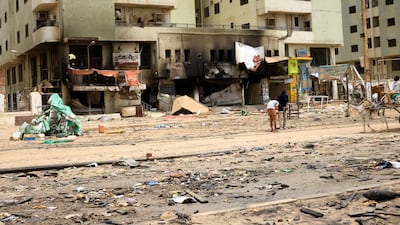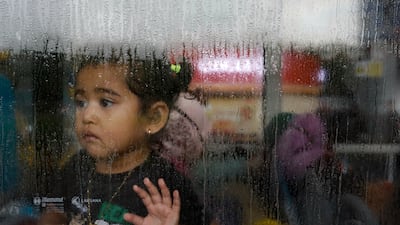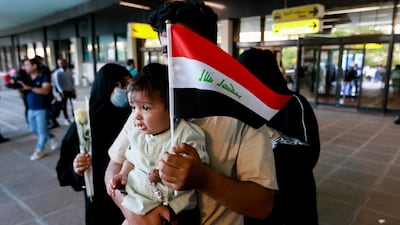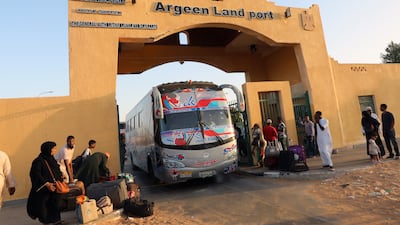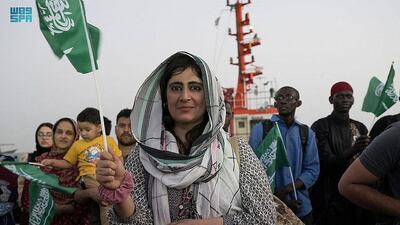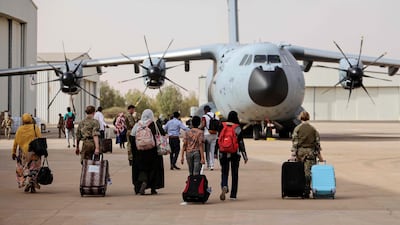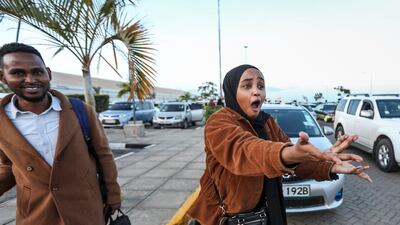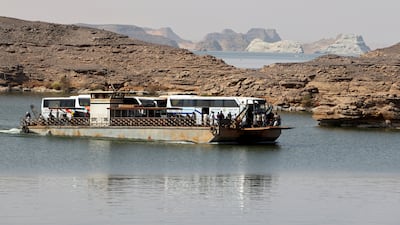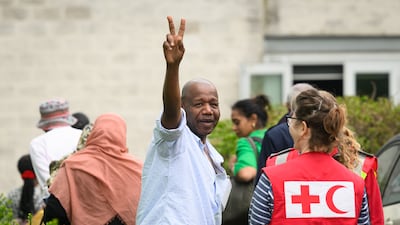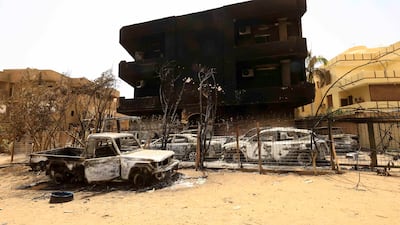Follow the latest news from the Sudan crisis here
A Turkish Air Force plane sent to evacuate civilians from Sudan was fired on, while landing at the Wadi Seyidna airport outside Khartoum on Friday.
Sudan's army accused the rival paramilitary Rapid Support Forces of carrying out the attack.
The RSF rejected the army's claim as an attempt to "mislead and spread lies" and said it was abiding "strictly" to the 72-hour ceasefire extension that the warring parties agreed to on Thursday night.
Turkey's Defence Ministry confirmed that one of its planes had been fired at, but said there were no injuries.
The Sudanese army posted photographs of the aircraft on its Twitter account, including one showing a bullet hole in the fuselage, and said the plane's fuel system had been damaged.
Residents and witnesses continued to report air strikes and violence in Khartoum and Sudan's western region of Darfur despite the extension of the ceasefire.
Air strikes hit RSF positions on Thursday night in the final hours of the initial 72-hour ceasefire, which was breached numerous times by both sides, who posted photos and videos of their operations.
The conflict has caused acute food shortages across the country. In Khartoum, residents are also facing a cash shortage, as banks have been closed since fighting began on April 15.
UN High Commissioner for Human Rights Volker Turk accused the RSF of removing people from their homes, amid fighting in densely populated areas in the capital.
He said residents continue to face “looting, extortion, acute shortages of food, water, electricity, fuel and limited access to healthcare and cash”.
A spokeswoman for Mr Turk told reporters in Geneva that the UN was “concerned at the serious risk of violence escalating in West Darfur”, warning that the hostilities between the military and RSF “have triggered intercommunal violence”.
“In El Geneina, West Darfur, deadly ethnic clashes have been reported, with an estimated 96 people killed since April 24,” she said.
In the city of Juneinah, West Darfur, shelters were set on fire and hospitals, offices of international humanitarian organisations and banks were looted, the Sudan Doctors Union said.
“The bloody events are ongoing in Juneinah city, leaving behind tens of people killed and injured,” the union added. It said it was not able to accurately count the casualties due to attacks on civilians.
Later on Friday, the union said the Al Juneinah hospital and its blood bank were robbed, indicating that fighters might be in need of medical assistance.
It also said that 15 hospitals were bombed and 19 were forced to evacuate. Ambulances were attacked and others were not allowed to pass to transport patients and pick up supplies, the union said.
The renewed ceasefire is the fifth attempt to quell fighting between Sudan's army, led by Gen Abdel Fattah Al Burhan, and the RSF, led by his deputy-turned-rival Gen Mohamed Dagalo.
Despite the repeated breaches, their decision to extend the ceasefire on Thursday drew international praise.
In a joint statement, the African Union, UN, Saudi Arabia, UAE, UK and US applauded their “readiness to engage in dialogue towards establishing a more durable cessation of hostilities and ensuring unimpeded humanitarian access”.
Doing so, they said, could be followed by a de-escalation plan mapped out in a blueprint for peace on April 20.
“We welcome the Sudanese Armed Forces and Rapid Support Forces' announcement extending the ceasefire in Sudan by an additional 72 hours,” US Secretary of State Antony Blinken posted on Twitter.
Shelling continues
On Thursday, warplanes flew over the capital's northern suburbs as fighters on the ground exchanged artillery and heavy machine gun fire, witnesses said.
“I hear intense shelling outside my home,” a Khartoum resident told AFP on Thursday.
At least 512 people have been killed and 4,193 wounded in the fighting, the Health Ministry said, but the true figures are likely to be higher as bodies are unclaimed in some areas.
Hospitals have been shelled and more than two thirds are out of service, the doctors' union said, adding that at least eight civilians were killed on Wednesday alone.
The World Food Programme has said the violence could plunge millions more into hunger in a country where 15 million people — one third of the population — need aid.
Abdou Dieng, UN aid chief in Sudan, said from Port Sudan on Thursday that he was “extremely worried about the situation”, with food supplies a huge concern.
Agence France-Presse contributed to this report
